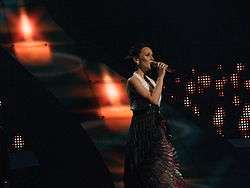Hungary in the Eurovision Song Contest
Hungary has participated in the Eurovision Song Contest 17 times since making its debut in 1994. Hungary attempted to participate in 1993 but failed to qualify from a special qualifying competition set up for seven former eastern bloc countries.
| Hungary | |
|---|---|
 | |
| Member station | Duna Media Service Provider |
| National selection events | National final
Internal Selection
|
| Participation summary | |
| Appearances | 17 (14 finals) |
| First appearance | 1994 |
| Best result | 4th: 1994 |
| External links | |
| MTV page | |
| Hungary's page at Eurovision.tv | |
Hungary in the Eurovision Song Contest 2019 | |
Hungary's first contest in 1994 remains its most successful, with Friderika Bayer finishing in fourth place. The country's only other top five result is András Kállay-Saunders' fifth-place in 2014. Their other top ten results are Magdi Rúzsa finishing ninth in 2007, ByeAlex tenth in 2013, and Joci Pápai eighth in 2017, giving Hungary a total of five top ten placements.
History
The country's first entry would have been "Árva reggel", performed by Andrea Szulák, in 1993, but a qualification round was installed just for former Eastern Bloc countries, and the song did not manage to qualify to the grand final. The first official participation was of "Kinek mondjam el vétkeimet?", performed by Frederika Bayer, in 1994. Hungary received the maximum score of 12 points from the first three countries to vote. However, as the competition progressed, it attracted fewer votes, and finished in fourth place.
The 1995 entry was not as successful, garnering only 3 points, narrowly beating last-place Germany. In 1996 Hungary again failed to qualify when "Fortuna", performed by Gjon Delhusa did not qualify from the pre-qualification round.
Hungary withdrew after the 1998 contest, returning in 2005, where they finished in 12th place in the final with "Forogj, világ!", performed by NOX. However, Hungary withdrew again in 2006, returning in 2007 with "Unsubstantial Blues", the first Hungarian entry in English, performed by Magdi Rúzsa, the winner of the 3rd season of the Hungarian talent show Megasztár. The song came 9th in Helsinki, receiving 128 points in the final.
After coming last in the semi-final in the 2008 contest, Magyar Televízió (MTV), the Hungarian broadcaster, confirmed Hungary's participation at the 2009 contest in Moscow. After MTV's original choice was revealed to have been released before 1 October 2008, breaking contest rules, it was decided that "Dance with Me", performed by Zoltán Ádok, would be Hungary's entry, after MTV's second choice to represent Hungary declined.[1][2] The song placed 15th in the second semi-final, failing to qualify for the grand final for the second time since the introduction of the semi-finals in 2004.
In October 2009, MTV confirmed that they would not participate in the 2010 contest due to financial limitations in the company which would prevent them from sending an entry to the contest in Bærum, Norway.[3] Duna TV broadcast the event live and applied for EBU membership to send a representative to Düsseldorf in 2011. However, during the EBU's 65th conference, Duna TV's bid to become an active member was rejected. In December 2010, it was confirmed that MTV had agreed to return to the 2011 edition.[4] MTV internally selected the song "What About My Dreams?", performed by Kati Wolf. The song placed 7th in the first semi-final with 72 points, and was the first entry representing Hungary to qualify for the final since 2007. In the final, the song placed 22nd with 53 points.
In 2012, MTV organised a national final, A Dal, to select the Hungarian entry for the contest in Baku. The song "Sound of Our Hearts", performed by Compact Disco, was selected. The song placed 10th in the first semi-final with 52 points, and 24th in the final with 19 points. As of 2019, A Dal has been used as the Hungarian selection process every year since.
In 2013, Hungary reached the top 10, when the song "Kedvesem (Zoohacker Remix)", performed by ByeAlex, placed 10th with 84 points. Hungary reached the top 5 in 2014, when the song "Running", performed by András Kállay-Saunders, placed 5th with 143 points, achieving the best result Hungary has had since their first participation in 1994.
Hungary made it to the top ten once again in 2017, when the song "Origo", performed by Joci Pápai, placed 8th with 200 points, achieving their best result in three years.
In 2019, Hungary failed to qualify for the final, therefore not appearing in a final for the first time since 2010, when the country did not participate.
Hungary did not appear on the final list of participants for the 2020 contest.[5] MTVA stated that they would "support the valuable productions created by the talents of Hungarian pop music directly" instead of participating in the contest.[6] The withdrawal came during a rise of anti-LGBTQ+ sentiment among the leadership of Hungary and MTVA; while no official reason for the withdrawal was given by the broadcaster, an inside source speaking with the website Index.hu stated that the contest was considered "too gay" for MTVA to participate.[7]
Contestants
2 |
Second place |
3 |
Third place |
◁ |
Last place |
| Year | Artist | Language | Title | Final | Points | Semi | Points |
|---|---|---|---|---|---|---|---|
| Andrea Szulák | Hungarian | "Árva reggel" | Failed to qualify[lower-alpha 1] | 6 | 44 | ||
| Friderika Bayer | Hungarian | "Kinek mondjam el vétkeimet?" | 4 | 122 | No semi-finals | ||
| Csaba Szigeti | Hungarian | "Új név a régi ház falán" | 22 | 3 | |||
| Gjon Delhusa | Hungarian | "Fortuna" | Failed to qualify[lower-alpha 1] | 23 | 26 | ||
| V.I.P. | Hungarian | "Miért kell, hogy elmenj?" | 12 | 39 | No semi-finals | ||
| Charlie | Hungarian | "A holnap már nem lesz szomorú" | 23 | 4 | |||
| NOX | Hungarian | "Forogj, világ!" | 12 | 97 | 5 | 167 | |
| Magdi Rúzsa | English | "Unsubstantial Blues" | 9 | 128 | 2 | 224 | |
| Csézy | English, Hungarian | "Candlelight" | Failed to qualify | 19 ◁ | 6 | ||
| Zoli Ádok | English | "Dance with Me" | 15 | 16 | |||
| Kati Wolf | English, Hungarian | "What About My Dreams?" | 22 | 53 | 7 | 72 | |
| Compact Disco | English | "Sound of Our Hearts" | 24 | 19 | 10 | 52 | |
| ByeAlex | Hungarian | "Kedvesem (Zoohacker Remix)" | 10 | 84 | 8 | 66 | |
| András Kállay-Saunders | English | "Running" | 5 | 143 | 3 | 127 | |
| Boggie | English | "Wars for Nothing" | 20 | 19 | 8 | 67 | |
| Freddie | English | "Pioneer" | 19 | 108 | 4 | 197 | |
| Joci Pápai | Hungarian | "Origo" | 8 | 200 | 2 | 231 | |
| AWS | Hungarian | "Viszlát nyár" | 21 | 93 | 10 | 111 | |
| Joci Pápai | Hungarian | "Az én apám" | Failed to qualify | 12 | 97 | ||
Awards
Marcel Bezençon Awards
| Year | Category | Song | Composer(s) lyrics (l) / music (m) |
Performer | Final | Points | Host city | Ref. |
|---|---|---|---|---|---|---|---|---|
| 2007 | Composer Award | "Unsubstantial Blues" | Magdi Rúzsa (m) and Imre Mózsik (l) | Magdi Rúzsa | 9 | 128 |
Winner by OGAE members
| Year | Song | Performer | Place | Points | Host city | Ref. |
|---|---|---|---|---|---|---|
| 2011 | "What About My Dreams?" | Kati Wolf | 22 | 53 |
Related involvement
Commentators and spokespersons
| Year | Commentator | TV channel | Spokesperson | Ref. |
|---|---|---|---|---|
| 1993 | István Vágó | M1 | Did not participate | |
| 1994 | M2 | Iván Bradányi | ||
| 1995 | M1 | Katalin Bogyay | ||
| 1996 | M2 | Did not participate | ||
| 1997 | M1 | Györgyi Albert | ||
| 1998 | Gábor Gundel Takács | Barna Héder | ||
| 1999–2004 | No television broadcast | Did not participate | ||
| 2005 | Zsuzsa Demcsák, András Fáber, Dávid Szántó | M1 | Zsuzsa Demcsák | |
| 2006 | No television broadcast | Did not participate | ||
| 2007 | Gábor Gundel Takács | M1 | Éva Novodomszky | |
| 2008 | ||||
| 2009 | M1 HD | |||
| 2010 | Zsolt Jeszenszky | Duna HD | Did not participate | |
| 2011 | Gábor Gundel Takács | M1 HD | Éva Novodomszky | |
| 2012 | ||||
| 2013 | ||||
| 2014 | ||||
| 2015 | Duna HD | Csilla Tatár | ||
| 2016 | ||||
| 2017 | Krisztina Rátonyi and Freddie | |||
| 2018 | Bence Forró | |||
| 2019 | ||||
Photogallery
 Magdi Rúzsa in Helsinki (2007)
Magdi Rúzsa in Helsinki (2007)


 András Kállay-Saunders in Copenhagen (2014)
András Kállay-Saunders in Copenhagen (2014)

 Joci Pápai in Kyiv (2017)
Joci Pápai in Kyiv (2017)
 Joci Pápai in Tel Aviv (2019)
Joci Pápai in Tel Aviv (2019)
Notes and references
Notes
- Hungary attempted to qualify in 1993 when there was a pre-qualifying round for seven countries hoping to make their debut in the contest and in 1996 when there was an audio-only pre-qualifier for all countries (excluding hosts Norway). Hungary is one of only two countries (along with Romania) to have unsuccessfully attempted to participate in both 1993 and 1996. The official Eurovision site does not count either year in Hungary's list of appearances.
References
- Klier, Marcus (10 February 2009). "Hungary: Kátya Tompos withdraws from Eurovision". esctoday.com. ESCToday. Retrieved 18 October 2019.
- Jiandani, Sanjay (23 February 2009). "Hungary: Zoli Adok to Eurovision". esctoday.com. ESCToday. Retrieved 18 October 2019.
- Hondal, Victor (22 October 2009). "Hungary withdraws from Eurovision Song Contest". esctoday.com. ESCToday. Retrieved 18 October 2019.
- Hondal, Victor (27 December 2010). "Hungary returns to the Eurovision Song Contest". esctoday.com. ESCToday. Retrieved 18 October 2019.
- Herbert, Emily (13 November 2019). "41 Countries Will Participate in The Eurovision Song Contest 2020". eurovoix.com. Retrieved 14 November 2019.
- Jiandani, Sanjay (29 October 2019). "Hungary: MTVA withdraws from Eurovision 2020". esctoday.com. Retrieved 16 November 2019.
- Walker, Shaun; Garamvolgyi, Flora (27 November 2019). "Hungary pulls out of Eurovision amid rise in anti-LGBTQ+ rhetoric". The Guardian.
- "Marcel Bezençon Awards". eurovision.tv. Archived from the original on 16 July 2019. Retrieved 8 December 2019.
- Cobb, Ryan (21 April 2017). "Analysing ten years of OGAE voting: "Underneath the fan favourite bias is a worthwhile indicator"". escxtra.com. Retrieved 8 December 2019.
- Adams, William Lee (9 July 2015). "Poll: Who was the worst dressed Barbara Dex Award winner?". Wiwibloggs. Retrieved 8 December 2019.
- Farren, Neil (6 December 2017). "Hungary: A Dal 2018 Participants Announced". eurovoix.com. Retrieved 18 November 2019.
- ""May we have your votes please?"". eurovision.tv. EBU. 11 May 2018. Retrieved 18 November 2019.
- "Eurovision 2019 Spokespersons – Who will announce the points?". eurovisionworld.com. 18 May 2019. Archived from the original on 2 June 2019. Retrieved 18 November 2019.
External links
- Points to and from Hungary eurovisioncovers.co.uk